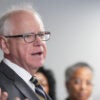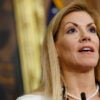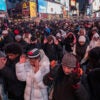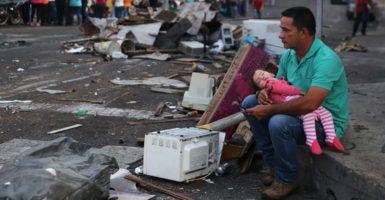In the 1980s, Patricia Rucker’s family left Venezuela, planning that her father would work for a time in the U.S. “Venezuela to me was the most perfect country you could have on this earth,” Rucker recalls. “Not only beautiful weather—beautiful people, very moral, very safe, very free, never had an income tax. The Constitution of Venezuela was modeled after the U.S. Constitution.”
But the family’s plans changed, even as Venezuela fundamentally changed. “Hugo Chavez was able to win an election by making promises and sowing envy, telling folks you should have what others have, you should have whatever, the nice houses,” Rucker warns. “You should get this, you should get that.”
Now a U.S. citizen and a West Virginia state senator, Rucker is speaking out about the dangers of socialism. Read the lightly edited interview, posted below, or listen on the podcast:
We also cover the following stories:
- The House Democrats announce the next impeachment step.
- President Donald Trump criticizes FBI Director Christopher Wray.
- Most Americans didn’t talk politics at Thanksgiving.
The Daily Signal podcast is available on Ricochet, iTunes, Pippa, Google Play, or Stitcher. All of our podcasts can be found at DailySignal.com/podcasts. If you like what you hear, please leave a review. You can also leave us a message at 202-608-6205 or write us at [email protected]. Enjoy the show!
Daniel Davis: We’re coming to you from the annual meeting of ALEC—that’s the American Legislative Exchange Council—this year in Phoenix, Arizona. I’m joined now by Patricia Rucker. She’s a state senator from West Virginia and the co-founder and former president of We the People of West Virginia, Jefferson County. Patricia, thanks for your time today.
Patricia Rucker: Absolutely. Thank you for inviting me.
Davis: One of the very interesting things about you is that you were born in Venezuela and your family immigrated here, I believe in the early ’80s, is that right?
Rucker: That’s correct, 1981. We came here because of my father’s work. We came here legally. He had a work visa, but we always planned on returning to Venezuela.
Venezuela to me was the most perfect country you could have on this earth. Not only beautiful weather, beautiful people, very moral, very safe, very free, never had an income tax. The Constitution of Venezuela was modeled after the U.S. Constitution and close-knit family. I mean really, I just can’t talk … I can’t tell you how beautiful it was and we always intended to go back there.
Now I did meet my husband and that’s when I finally said, “Well, maybe I’m going to end up staying.” He’s an American and I did apply for permanent residency after I graduated from college and got married.
Having said that, just so you know … First of all, it took me over eight years to become a citizen. That’s how long and complicated it took. I already had four children before I got my citizenship in 2004, but obviously a lot of folks know about what’s happened to Venezuela and I just want to briefly touch on the tragedy that it was.
Hugo Chavez was able to win an election by making promises and sowing envy, telling folks you should have what others have, you should have whatever, the nice houses. You should get this, you should get that.
I mention it as a cautionary tale because so many Americans believe that we could never go down the road of Venezuela or other countries and I can tell you, I never would’ve thought that would’ve happened to Venezuela either.
Anyone who wants to see what the fruits of socialism is, all you have to do is just look at this modern day example. In 10 years, Chavez completely destroyed that freedom and that heritage Venezuelans had been enjoying since essentially 1823, I believe.
Davis: Wow. You still remember living there before you moved here?
Rucker: Oh, yes, absolutely. Of course, we went back every other summer while we were growing up because, again, my dad was here for work. They paid for us to go back every other summer and be in Venezuela and almost all my relatives continue to live in Venezuela.
Davis: Wow. … The erosion of freedom and the socialism that came to … is that a big reason why your family didn’t go back?
Rucker: Yes, it is actually the main reason. My parents were always planning on retiring to Venezuela. They kept their home all of this time in Venezuela. Kept it up and everything else.
One of the things that Chavez did within the first year and a half of his presidency was declared that if you weren’t physically living in your home, it meant you didn’t need it. Anyone who wanted to break into a home that was empty, the government would protect the right to stay there. Again, people don’t understand those type of real-life experiences with socialism and how it works.
Another thing that Chavez did that of course hurt the ability for my parents to retire is he nationalized almost everybody’s savings or businesses. [He] made it really difficult for you to retire because you would lose your money. My parents, only in 2014 or ’15 did they finally give up on their dream of returning to Venezuela and applied for citizenship.
Davis: Wow. You mentioned breaking into homes. Did that happen to your parents’ house?
Rucker: Yes and to my grandparents’ house, because my grandparents died and the family wasn’t exactly sure what they were going to do with the apartment, but in the meantime, the apartment was broken into and stolen.
Davis: And there was no legal recourse? No way to sue anybody?
Rucker: Think about it. If the police are told you are to protect the squatter who breaks into your home, who are you going to go to? …
Again, another thing that most people do not understand, we take it for granted here, that the police are going to be law abiding and follow the law. The culture in South America, I think in general, not just in Venezuela, is yes, obviously, the police … [are] supposed to enforce the law, but there’s a lot of corruption. It’s very often in a lot of countries you have to pay them to make sure that they do what you’re asking them to do.
In Venezuela, it became so much worse under Chavez. He did not care to end that kind of corruption and it became where if you wanted to have any protection, you better have the money to pay for it.
Davis: Of course things have just gotten so much worse in the last few years.
Rucker: It is no man’s land at this point and because [Venezuelan dictator Nicolas] Maduro knows that he can’t trust Venezuelans to support him, he has hired Cuban nationals to be the military, to be the protection.
Do you think that these Cubans, who are the ones that have the guns, are going to care that much about Venezuelans who are not happy, don’t feel the election was secure, all of these concerns? No, they’re not really on the people’s side.
Essentially, I have to say we’ve been taken over by [a] foreign country. It’s not Venezuela anymore. It is Cuba who has taken over Venezuela and uses it for whatever their purposes and whatever they want and there is no way to peacefully end that when the Venezuela citizens do not have arms, do not have any way to fight back.
Davis: Do you have relatives that are still there?
Rucker: Yes, most of them.
Davis: Do you keep in touch with them?
Rucker: We do, the ones who have access to electronic forms of communication. Facebook, WhatsApp, that kind of thing, we use [them] to talk to them.
I will tell you, most of them are so terrified of their conversations being seen by the government that we usually cannot get real details on the truth of how bad things are. They tend to gloss over it and kind of hint at it. Only when somebody is able to escape do we really hear about the truth of how bad it is.
Davis: Wow. That’s remarkable. It’s almost like hearing from somebody behind the Iron Curtain back 40 years ago, but it’s happening right now.
Rucker: It is. It is just like that. I mean, [it’s] unbelievable … how scared they are of being spied upon.
Davis: Wow. Well, you’re someone who has really lived the American dream. You moved here when you were just a child and became a teacher, but after, what was it, 20 years, you decided to homeschool your children. Tell me about that process and why you made that shift.
Rucker: Sure. Just to let everybody know, I was a product of public school education and loved it and had a wonderful public school education here in the United States of America.
When I was 11, I said, “This is what I want to do, I want to teach.” I [had a] single-minded focus, “I want to teach social studies in public schools.” And when I graduated I did that for about a year and a half or so, but I became pregnant with my firstborn and the minute they laid her in my arms, I knew I couldn’t go back to the classroom. She was my priority. I ended up having five children and when … it was time for [my oldest] to go to kindergarten, she was diagnosed [with] autism spectrum disorder.
Around 2005 or so was around the time she was starting school. The public schools really did not have a handle on how to handle autism students and they wanted to put her in a special ed inclusive classroom with very severe special ed needs and she really didn’t need that kind of help.
I ended up deciding to homeschool her and I fell in love with it. I got a chance to teach, and not just social studies, but everything. That’s why [for] 15 years I basically homeschooled my children and had a wonderful experience doing so, even though that had never been in the original plan.
Davis: When you made that shift, did you take that on by yourself or were there resources at the time? I know … it’s becoming a lot more common just in the last 10, 15 years, but—
Rucker: It sure has. When I started there wasn’t quite as much support as there is now, but definitely the pioneers had already set the stage and there were some curriculums out there accessible for us to use and I definitely did find support.
Where I live in West Virginia, unfortunately, the education is not as well as most people would like and there is a very strong homeschooling community in Jefferson County, West Virginia.
Davis: Wow. [You’re homeschooling five kids] and you decided to run for the state Senate. You were elected in 2016. What inspired you to run for office?
Rucker: Well, I will admit that a lot of it had to do with what happened to Venezuela. Chavez got elected in 2000. By 2008, Venezuela was already pretty much lost and I did not want to see my newly adopted country, remember I became a citizen 2004, … going down that same path.
Some of the things that were said by the presidential candidate running in 2008 really concerned me. I was one of those folks that got involved.
Of course, you know about the tea party movement and We The People of Jefferson County was the tea party that got created in my county. And yes, I was the founder of it, but it was out of a deep desire to really stand up for what made America great, which is our Constitution and our rights. It really concerns me that there are so many people willing to accept promises made and lose the freedom for those promises.
I’ve been doing the job always of trying to educate others and deciding to run for office was an extension of that. I had already started going door to doors, founder of the tea party movement. I had gotten involved in elections to get good candidates elected who would protect those rights.
It came to a point that my own representative was someone who nobody wanted to run against. We were able to recruit folks, good folks, that we could support in all these different races but not in mine. Very reluctantly, I put my name in and the first time I ran I lost by 110 votes, but I ran again and this time for the Senate and I won by over 5,000.
Davis: Wow. How about that, 5,000 votes. You’re the chair now of the Education Committee in the state Senate. Obviously, as a teacher, I would assume you bring a lot of experience to that. How has your previous life as a teacher informed what you do now?
Rucker: … I will tell you that it’s almost held against me that I homeschooled. It completely discounts me as having any input because I homeschooled.
They don’t count homeschooling as being an educator of any kind. I will tell you though, I did experience a really good public school education. I felt that was excellent. I really want to see that for every student. I want everyone to be able to say, just like I can say, “I had a wonderful public education experience.”
My goal has been to take away the hurdles that are stopping teachers from being able to teach and bring more local control into West Virginia because it is a very centralized educational system.
I will say, I do support educational choice. For those parents who can’t get what they need, like I couldn’t for my oldest child, I want to make sure they have whatever they need, that that child be educated.
I will tell you that as a homeschooling parent, not every parent can homeschool. Both for financial reasons or other reasons. If their child is somehow not getting the education they need in the traditional public school, our priority as a state and as a people is to make certain that child gets what they need. That should be what is most important.
If it means a private school, if it means a public charter school, if it means giving them enough funds to get outside support or tutorials, I’m in favor of as many options as possible because I believe parents are the ones who can best know what their child needs. I do not ever want to tell a parent who cannot afford something their child needs, “Too bad.”
I just can’t imagine that and it’s hard for me to believe that there are those who say, “No. Absolutely, the tax dollars should only be in public education.”
Well, you know how hard it is to be a public school teacher, where you have 25, 30 students and each of those students is unique and has different strengths and weaknesses? As a public school teacher you have to try to help everybody, which generally means you teach to the middle. That means there are kids on both sides of the spectrum that are not getting what they need. Giving more choices is not anti-public school. It is trying to make certain that we help everyone.
Davis: Wow. Well, last year there was a major teachers’ strike in West Virginia, which you must’ve been right in the middle of that controversy, being on the Education Committee. What was that like?
Rucker: I will confess that it was because of my education reform bill that the teachers went on strike.
I proposed a bill that was very comprehensive on education reform and needs. In addition to bringing more local control, it included a few changes to the funding mechanism, increasing the amount of money for nurses and counselors and psychologists for public schools. But it did include starting charter schools for the first time [in] West Virginia and legalizing it. It originally included ESAs [education savings accounts] for victims of bullying and students with special needs, in addition to other technical things that were [specific] to West Virginia.
Well, the charter school and the ESA portion caused the teachers to go on strike. I really was driven by the unions, who were telling the teachers, “We cannot accept this under any circumstances.” Even though it was just a very small, tiny, tiny amount of funding, they went on strike and they managed to table the bill indefinitely in the House because of their strike.
Davis: It wasn’t the National Education Association lobby that was pushing this?
Rucker: Oh yes, they came to West Virginia. We had Randi Weingarten there helping support the strike and the protesting, which is funny when the national organizations, teachers unions were the originators of the charter school idea. I just find that very humorous.
I will tell you that when they killed the bill, I mean that’s their prerogative, right? They killed the bill. Well, then they came and still wanted the teacher pay raise that the governor had promised them.
In the Senate we were very clear when we said, “Well, we want education reform. If we’re not going to get education reform, we’re not going to pass that teacher pay raise.” That hard stance that we made caused the governor to call for a special session on education reform. After a very long extended special session, we did finally get some education reform passed in the state of West Virginia.
Davis: What kind of reforms?
Rucker: We got three charter schools and open enrollment. I don’t know if you know what that is. That allows students from a county to go to another public school, even outside of the county. And you only need permission of the school that’s accepting you, not permission of the school that you’re leaving. We also got some of the other things we wanted to do, like local control.
Davis: What are some of the things that you’re looking to push in the next year or so?
Rucker: Well, … it’s an election year. It’s always harder to do anything controversial in an election year, but we still have a lot of things that we still want to get to teachers.
Even though we were able to fund more counselors and psychologists and nurses for the schools, we still don’t have enough funding for one nurse in every single school. We’d love to see if we could reach that goal. I think that’s important.
Then there’s other things that we could do that won’t necessarily cost money, but just more accountability, clarifying what it is that we expect our graduates to have.
There’s been a lot of discussion here at ALEC about civics education and I’ll be honest, I haven’t looked, and considering I’m a history major and was a history teacher, you would’ve thought I would have looked into that, but I haven’t looked to see what it is that we require. There’s lots of ways we can still continue to work on this.
Davis: Fantastic. We’ll have to leave it there, unfortunately, but Patricia, thank you so much for your time today.
Rucker: No problem. Thank you for having me.































